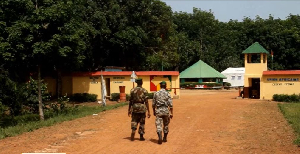Accra, Nov. 6, GNA - The Ministry of Health (MOH) on Thursday said it has initiated measures to involve District Assemblies in the selection, sponsoring and training of health professionals so that they could return and serve their respective districts after training.
Mr Moses Dani Baah, Deputy Minister of Health, who announced this in Accra, said the programme would promote the equitable re-distribution of health staff in the country.
In addition: "We are proposing that district assemblies should sponsor health professional already in training, especially nurses, medical doctors (in clinical years) and pharmacists in last two years and to bond them to work in their districts."
The Minister made these remarks in a speech read for him by Mr Owusu Agyei, Acting Chief Director of MOH, at the close of a 12-day workshop for Training of Trainers (TOT) on collaboration between the Ghana Health Service (GHS) and the District Assemblies.
The workshop attended by 40 participants drawn from the 10 regions was aimed at building effective partnership with Ministries, Departments and Agencies and District Assemblies in pursuit of resolving inequities in health care delivery and promoting good health for all.
The Minister noted that over the years, health workers had worked in isolation and had had difficulty in working with the district assemblies and other stakeholders because of lack of collaboration.
He said collaboration between health workers and district assemblies was of much importance to MOH because the assemblies had a unique advantage of being closer to the masses at the grassroots.
"Our district assemblies are truly strong and capable and can, therefore, constitute the backbone of our achievements through policy implementation."
Dr Dani Baah commended DANIDA for it's immense support to MOH to develop a manual for district workers that would help promote effective collaboration and establish a platform for an action plan.
Mr Kwado Adjei Darko, Minister of Local Government and Rural Development, noted that almost every non-health sector was health related and this, he said required health workers to collaborate with other sectors to attain national goals.
He said households and communities created health problems and it behove them to solve those problems, adding; "to work with the community and to use the community resources is really the way to establish community initiatives and response".
Alhaji Dr Mohammed Bin Ibrahim, Coordinator TOT of GHS, stressed the need for all to join hands in tackling the numerous health and health related problems in the districts.
He urged all District Chief Executives to put health issues on the developmental agenda in their respective districts and also to arrest the deterioration of health.
"Key national agencies responsible for coordinating different public service organisation for sanitation, control of diseases such as malaria, tuberculosis and eradication of guinea worm should be provided with effective framework for the convergence of their comparable advantages and institutional integrity," he said.
General News of Thursday, 6 November 2003
Source: GNA












